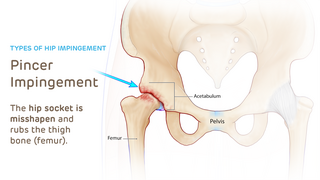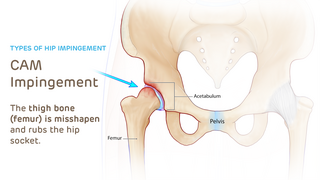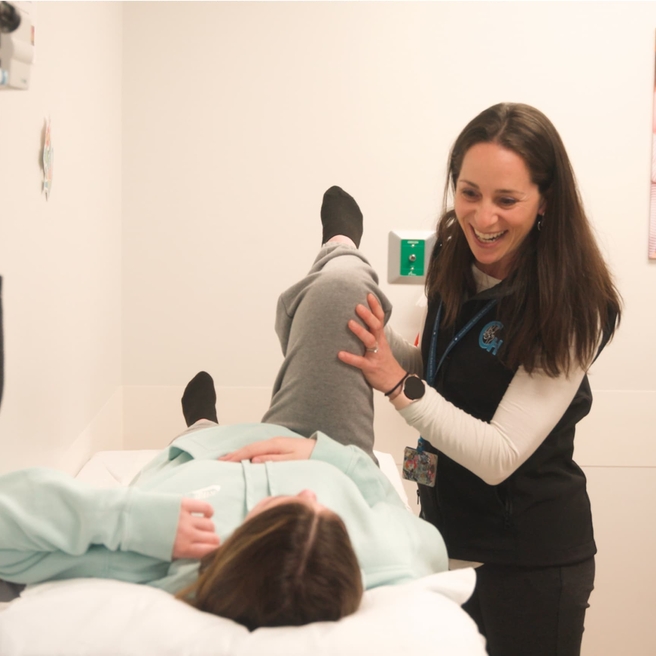What is femoroacetabular impingement?
Femoroacetabular impingement (FAI), also called hip impingement, is a condition where the top of the thigh bone (femoral head) does not fit properly into the hip socket (acetabulum). This mismatch can lead to abnormal contact between the “ball" and the "socket” of the hip joint when the hip is being bent (in flexion).
Over time, this repetitive motion of the abnormally shaped hip joint can cause pain and limit hip movement. It can also damage the labrum, the O-ring type soft tissue structure that runs along the rim of the hip socket. In severe cases, there can be damage to the articular cartilage that lines the socket as well.
FAI is more common in males than females, and often affects active individuals involved in sports that require a lot of hip bending (flexion), running and rapidly changing directions.
Symptoms of hip impingement
Some people with FAI can live active lives and never experience pain or hip problems. Others – especially athletic and active people – may feel pain in their hip or thigh. This pain is often worse when sitting down or standing for a long period of time. Individuals with FAI may feel a clicking, popping or a pinching sensation deep inside their hip joint. Sometimes the hip can lock up or feel like it gets stuck in certain positions.
Pain due to FAI typically begins as mild with activity, but often worsens over time and may cause pain with upright activities such as walking and climbing stairs.
Types of hip impingement
There are three types of hip impingement:
Pincer impingement, where the hip socket (acetabulum) is misshapen, too deep, or extends further over the "ball" (top of the thigh bone) than normal.

CAM impingement, where there can be a prominent bump on the top of the thigh bone (femoral head), or "ball," causing it to be fuller or flatter than normal.

Combined pincer and CAM impingement, where both sides of the hip joint (both the ball and socket) are misshapen.

Diagnosis of hip impingement
A diagnosis of FAI may be suspected after a clinician has gotten a detailed patient history and performed a physical examination. During the exam, the doctor will evaluate how the patient’s hip moves while walking, standing and sitting.
Clinicians may ask patients to:
- Describe the type of pain they feel,
- Explain what type of activities cause pain, and
- Explain which positions are most problematic.
X-rays can help clinicians evaluate the shape of the ball (top of thigh bone) and hip socket to look for possible causes of impingement. X-ray findings can be subtle. It’s important to seek pediatric orthopedic experts who can accurately diagnose the condition and determine next steps.
Children’s Hospital of Philadelphia (CHOP) offers advanced imaging to help doctors see and understand what’s going on deep inside the patient’s hip socket. We may recommend added specialized imaging studies – all of which are available at CHOP – including:
- 3-D reformatting imaging, which uses a combination of X-rays and computed tomography (CT) scans to create three-dimensional models of the hip anatomy.
- Delayed gadolinium-enhanced MRI of cartilage (dGEMRIC), an imaging technique that focuses on finding early cartilage breakdown. This method helps map areas of early osteoarthritis or specific cartilage injuries.
- Radial hip plane imaging, which uses MRI to take image slices of the hip joint around the ball and socket. This method helps find areas of possible FAI impingement better than traditional X-rays.
Treatment for FAI/hip impingement
Treatment for hip impingement typically starts with non-surgical options such as activity modification, physical therapy, ultrasound-guided injections and/or anti-inflammatory medications. Medications – whether by mouth or injection – offer patients relief from pain while they receive physical therapy support. The goal is to build strength, endurance and stability in their pelvis and hip in the hopes they can avoid the need for surgery.
If patients do not improve with non-surgical treatment, hip arthroscopy – a minimally invasive surgery – may be recommended. In hip arthroscopy, surgeons make a few small incisions on the outside of the hip, then use special tools to reshape how the thigh bone and hip socket fit together. Additionally, for patients with a torn hip labrum, the arthroscopic surgeon can clean and repair the labrum with stitches via a minimally invasive procedure.
For many patients, hip arthroscopy relieves pain from FAI and improves the function of the hip joint so they can continue their lives.
In some cases, hip arthroscopy is not going to be enough. Instead, a larger, more complex surgery may be the best option. Hip specialists can help determine which surgery will be best for each individual patient based on their history and workup.
Surgical procedures used to correct hip impingement include:
- A periacetabular osteotomy (PAO) changes the orientation of the hip socket. In this procedure, part of the pelvis is cut and repositioned, so the hip socket and ball of the thigh bone are better aligned.
- A derotational osteotomy corrects a deformity in the thigh bone. In this procedure the femur is cut, rotated into a better position, and then secured with a rod or plate.
What to expect after surgery
After surgery for FAI, it will take time for patients to regain their strength. Patients will need physical therapy to regain skills needed for everyday life like going up and down stairs and getting in and out of the car. Patients will be taught exercises to increase strength, agility and flexibility.
The goal of physical therapy after surgery is to help patients resume an active lifestyle – whether that includes playing a sport or not – and to prevent another injury in the future.
Long-term outlook
After treatment for FAI, patients are encouraged to follow-up annually with CHOP’s Young Adult Hip Preservation Program – even into their 20s and 30s. In most cases, patients resume active lives, playing sports, raising families and enjoying many other activities.
Why chose CHOP for FAI treatment?
Orthopedic surgeons and physicians at Children’s Hospital of Philadelphia (CHOP) provide expert care, cutting-edge treatments and the best outcomes for all types of hip disorders that began with or developed in childhood. Our Young Adult Hip Preservation Program is part of the nation’s #1 ranked pediatric orthopedic program in the world according to U.S. News & World Report’s 2024-2025 rankings of the nation’s top children’s hospitals.
For some, a hip disorder doesn’t become problematic or painful until adulthood – but often stems from an underlying pediatric hip condition. The causes and treatment for disorders like femoroacetabular impingement require the expertise and knowledge of doctors – like those at CHOP – who understand the full developmental spectrum of the human hip. Unlike adult providers who may suggest a hip replacement, CHOP physicians aim to reconstruct and enhance the natural hip and hip socket to prolong the function of the natural hip – decreasing the need for an artificial hip replacement now and in the future. Learn more about CHOP’s hip experience, expertise and comprehensive care.

Why choose CHOP
CHOP’s Hip Preservation Program focuses on hip conservation in young adults to stop continued damage and prevent the need for premature hip replacement.
Resources to help
Young Adult Hip Preservation Program Resources
We have created resources to help you find answers to your questions and feel more confident in decisions you make about treatment.

